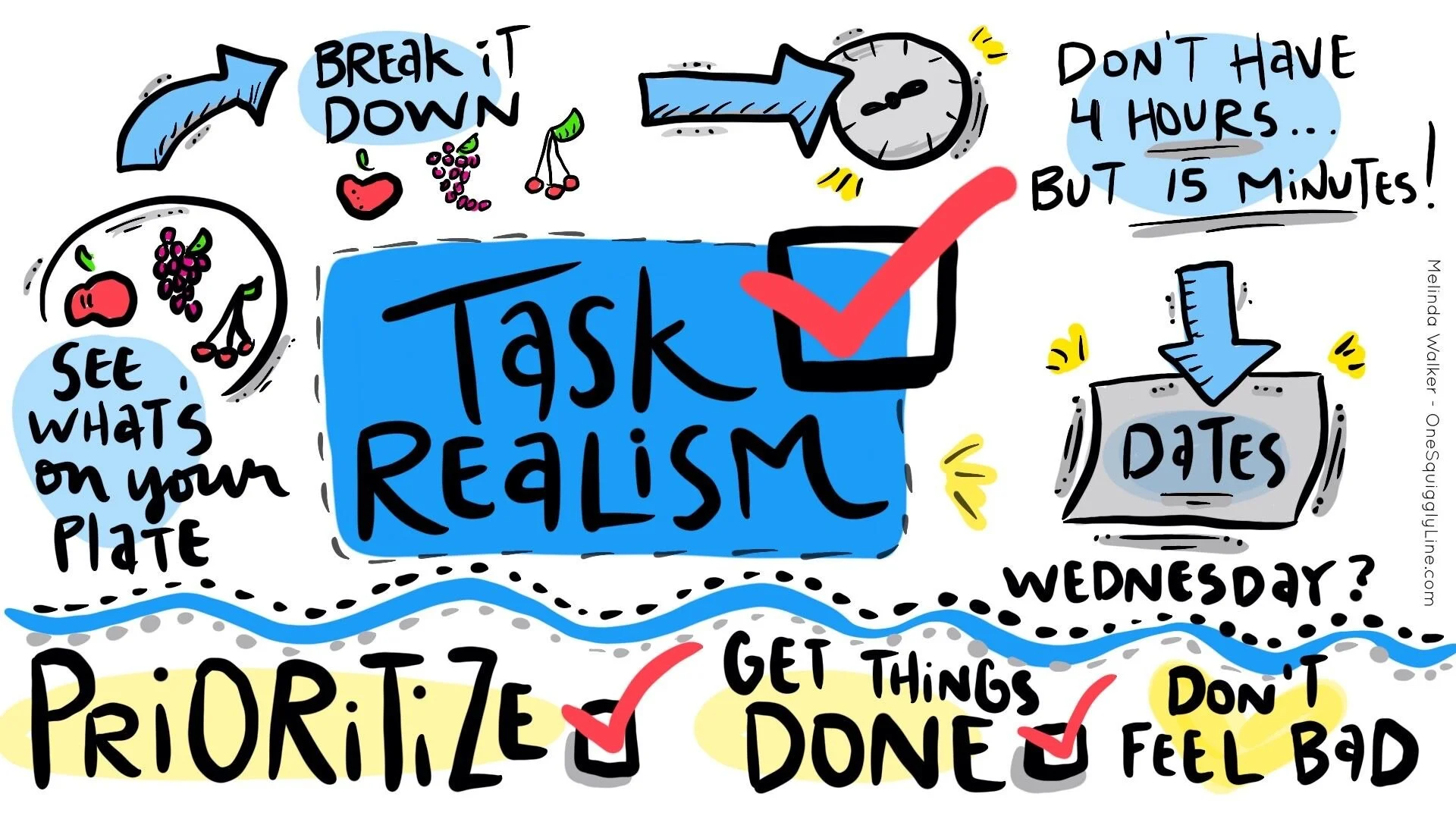6 Tips to Help You Prioritize in Times of Crisis
Drawing by Melinda Walker of One Squiggly Line
You’ve probably heard me talk about task realism before.
But if not, here’s what I mean by it:
We’ve only got a certain number of hours in the day. And we’ve got a list of stuff we want to do. How well do those 2 things match up? Do you have enough time in the day to do the things you want to do? Do you know?
Put another way, if you only have time to knock 3 things off your list today, would you rather have a list of 3 things, and get them all done? Or would you rather have a list of 10 things, and get only 3 done. The end result is the same. 3 things got done. But in the first scenario, the scenario that embraces task realism, you get everything done and you feel fantastic. In the second scenario, you get less than a third of what you wanted to get done, done.
In other words, it’s all about expectations.
When we are realistic with our expectations of ourselves and others, we end up in a better place. The trick is, we want to ensure that those 3 things we put on the list, are the most important. So we have to ruthlessly prioritize. And if we prioritize correctly, then we know that what we did today was more important than what we didn’t do. And that’s what I’m going for. If I can live a life where every day I know that the things I did were more important than the things I didn’t do, it becomes much easier to accept that I’m not going to get to all the things. Because I’m not. That’s not how life works.
While I think task realism is really quite central to my whole philosophy of time management (heck, I’m pretty sure I coined the term!), I think it’s even more crucial in times of crisis. And we are, most certainly, in a time of crisis right now. In a time of multiple crises with COVID-19 and the continued fight for racial justice.
When we are in times of crisis, we have fewer reserves to draw on and yet the demands on us are often far greater.
Many of us have much less time that we did before. Even if we’ve got more time, it’s unstructured and we feel unstable. We don’t feel like we can make solid plans for the future. Because we can’t. There are too many unknowns. And to accept that is hard.
We can make plans. And they will need to change. But you know what? That’s how life goes anyway. I make a plan for tomorrow at the end of every day. But I, like you, live in the real world, and so that plan I make also needs to be adjusted, every single day. And that’s OK. The fact that a plan needs to adapt doesn’t negate the planning itself. It simply means I’m farther along the path to realism.
Here are a few ways you can embrace task realism in times of crisis:
Take care of your physical self.
Get back to basics. Ensure you’re getting enough sleep, eating right, and moving your body. If this stuffs not covered, everything else will be harder.
Set your expectations low.
When schools were closed in March, very quickly I told myself to expect that my kids would not be returning to school until September. That way, I was able to think of longer term solutions instead of band-aid quick fixes that would fray and fall off. That way, when it became clear that no, we were not going back to school this year, I wasn’t shocked and I already had a plan.
Define your values.
This doesn’t have to be a big fancy exercise. Just get clear on the few over-arching concepts that are important to you. Then use these values as a litmus test for what you must do, what will help you to feel better, and what you can let go of.
Define the “must dos” and become a ruthless prioritizer.
Let stuff go. Lower your standards. Do what absolutely must be done and nothing more. Your bills do need to get paid, but nothing bad will happen if you’ve still got dirty dishes in the sink when you wake up.
Be honest with yourself about what you can handle.
At the end of the workday/school day do you have any available reserves to get anything productive done? If not, just accept that. It’s OK. Plan instead to read or watch Netflix or whatever you need to do to get by. Tackle the other stuff on the weekend, after you’ve had a good sleep.
Ask for help.
You don’t need to carry the whole load. If your “must dos” are too much for just you, start delegating (er, asking nicely) to your kids, partner, roommates, etc. This is no time for martyrdom.
PS.
Click HERE for the 30 second live video of the above task realism drawing being made. (And if you think this drawing is amazing as I do, please check out more of Melinda’s work. Melinda is the owner of One Squiggly Line, a visual thinking business that uses hand-drawn visuals to make things clear, simple, and fun! Services include real-time, in person and virtual visual notes and illustration for events, conferences, workshops, and more.)


